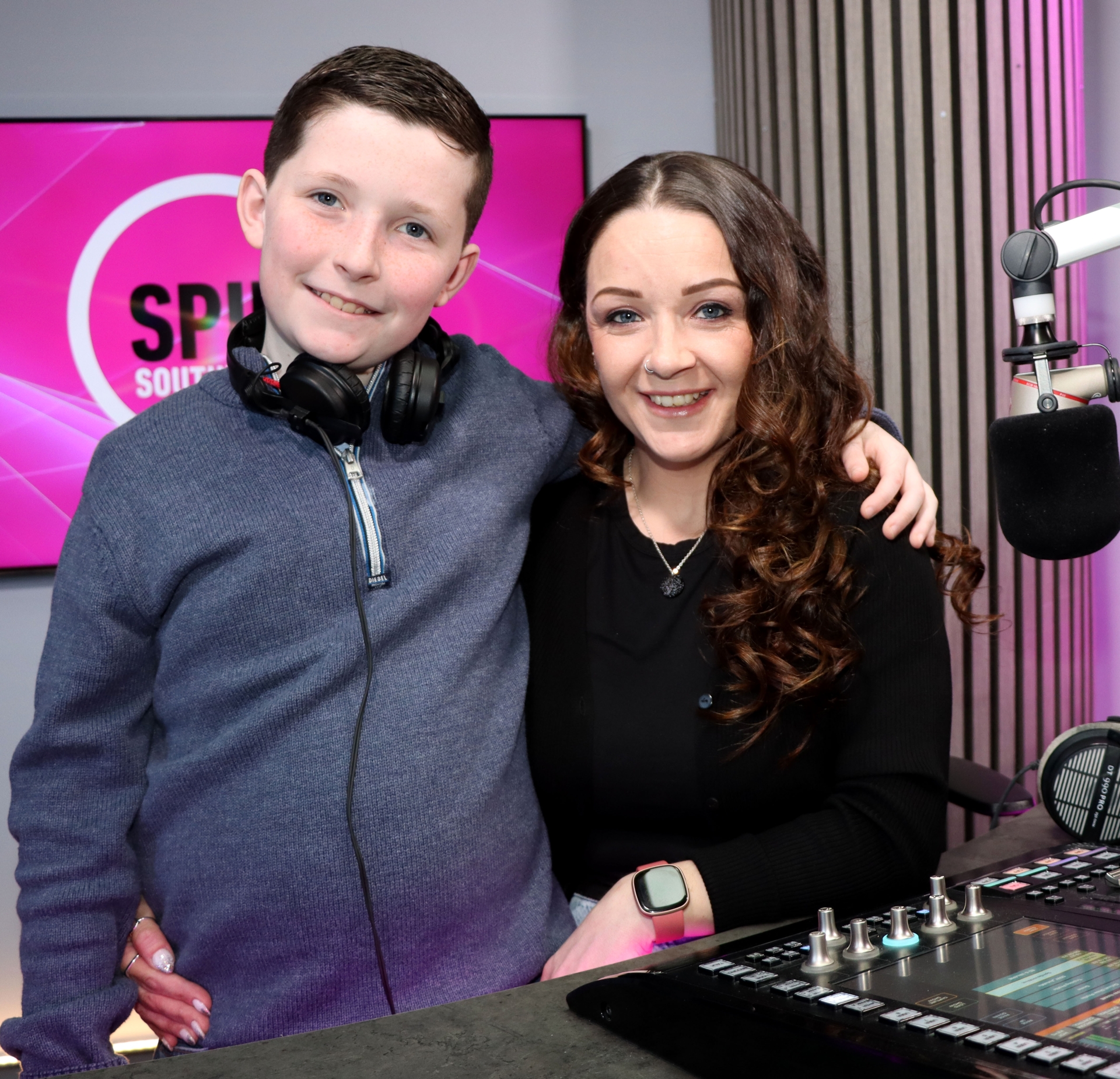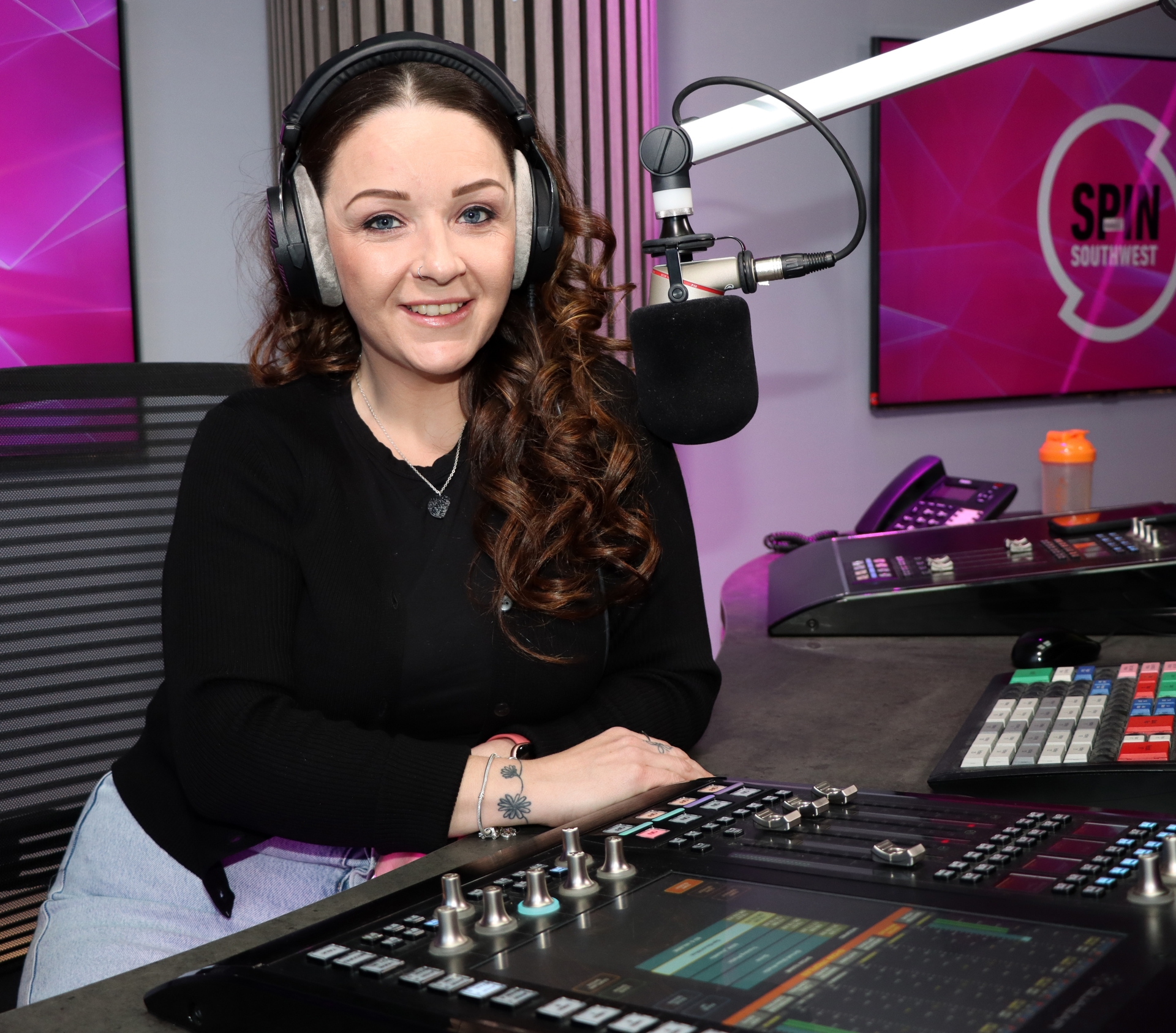
I PICTURES: Adrian Butler
READER DISRECTION IS ADVISED
FROM Cappamore to campaigning for change, broadcaster Katie Sheehan refused to be silenced and has used her voice to speak her truth and try to implement change for women.
Katie, who went to Doon Secondary School had a “tough journey” in life and a lot of what made this tough was her period which led her to be diagnosed with premenstrual dysphoric disorder (PMDD) later in life.
PMDD is a severe form of premenstrual syndrome (PMS) and it causes a range of emotional and physical symptoms every month during the week or two before your period and it can “cause women to get to the point where they don’t want to go on anymore.”
It took Katie to get to this moment in her journey to accept this was not going to be her faith and as April marks PMDD awareness month she encourages women to reach out for help if they feel like something is wrong in their bodies.
“When you are young, you are navigating through the newness of getting your period. Looking back now, the signs were always there, I just didn’t have the information. I thought this was your period and girls were always supposed to feel like crap. I first got my period when I was twelve and from there they were always very heavy and I could go months without one and then have one for months non-stop again.
“I remember getting this checked with the doctor and when you are that young, they will tell you that it is because of your age and it will become regular as you become older but for me it never happened. I went on for years with pains, aches, missed periods and I didn’t realise the effects it would eventually have on my body.”
It took until Katie was trying for children to come to terms with the fact that there was something wrong and it was when she looked into this further, she was diagnosed with endometriosis, a disease in which tissue similar to the lining of the uterus grows outside the uterus and makes it harder to get pregnant.
“I went to a gynaecologist and I was then diagnosed with endometriosis which answered my question as to why I was not getting pregnant as easily. From that moment I was lucky enough to get pregnant with my daughter Nicole with a little bit of help.”
After experiencing the moment Katie waited for her whole life she wanted to expand her family however had a miscarriage before giving birth to her second child Michael and knew something had changed mentally for her.
“My moods during that time changed from low to real depression and nothing in life made me happy or felt good and I was really struggling. I put it down to losing a baby and wanting another baby and then I got pregnant, I stopped trying and with no help out of nowhere it just happened and this just lifted my mood. I felt like I was getting this chance again and it was amazing.”

Katie thought nothing could impact this high she was feeling until later in her pregnancy she went for a scan and something was not right with the baby.
“I went for a private scan where they tell you everything and they said the baby’s bowel wasn’t developing quite as it should. I then gave birth to my son and it was a whole different struggle to find out that the reason for this was because he had cystic fibrosis.”
Cystic fibrosis is a disorder that damages your lungs, digestive tract and other organs. Often those who are suspected to have cystic fibrosis undergo a sweat test to determine.
Michael went to the Cystic Fibrosis Unit in University Hospital Limerick (UHL) soon after birth where he underwent a sweat test which confirmed he had the disease.
After hearing those words confirming her son had this disease, Katie explains she “checked out.”
“I remember thinking why is this happening. I went home and I read about cystic fibrosis and I cried so much. I still had to operate as a mother and looking back now I was a robot. My period then came back normal after having Michael but my dips in my mood kept getting lower. I put it down to the miscarriage and then Michael’s diagnosis so I put it to the back of my mind.”
After five years, Katie recognised a complete shift in her moods labelling it “uncontrollable.”
“I remember I went back to the gynaecologist and I expressed that it felt different. I started tracking my moods and it clicked with me that the lows came around my period.”
The doctor in the moment told Katie she had PMDD and presented Katie with a number of options including a hysterectomy to deal with this disorder.
After that moment, Katie admits “life continued to get harder for her,” and she decided she couldn’t go on anymore.
“Unfortunately I got to the point where I couldn’t go on. The mental struggle everyday from PMDD was excruciating. I tried to take my own life but I am so grateful that I am here today. I hold a lot of shame which I know a lot of people who have been in my position hold because you think how could you do that to those who love you or the kids who rely on you? However when you are mentally not even here anymore and the pain is that hard you can’t see any other way.”
After the attempt Katie went back to her gynaecologist and decided to go ahead and have a full hysterectomy.
“I was 32 when I went ahead with it. I had two children and I was so lucky. They needed me and the strongest me and the only way to do that was to have this procedure. Some women choose to keep their ovaries but after all the diagnoses and nearly losing my life to PMDD I wanted it all gone. I knew I would go into surgical menopause but it was something at the time that had to be better than how I was living.”
Katie was the first person in Ireland who had this procedure robotically in UHL which meant shorter recovery time but before being wheeled down to theatre, Katie did question if it was the right decision.
After the surgery Katie refers to her recovery time as the “fight back” and it was during this time and in caring for her son she discovered her passion for media.
A drug which has helped many cystic fibrosis patients in Ireland is Vanza Triple and during the time of Katie’s recovery this drug was not available. Katie campaigned going on as many media outlets as possible with other cystic fibrosis parents until in 2019 the drug was brought to Ireland.
After this Katie had time to think what her next step would be and she decided her true calling other than being a mother was media.
Starting out working in community radio in Limerick, Katie went on to now cover weekends on Spin SouthWest.
“It is so special to me. I wanted to show my kids I could turn my life around and if you believe in something just go for it.”

On what is next for Katie, she explains she wants to continue to use her voice to make a change.
“I want to use my voice to show people they can have everything they want. To tell girls to listen to their bodies, get help and don’t settle for an answer if you don’t feel right. To let parents of a cystic fibrosis child know it will be ok.”
To hear more from Katie, you can tune into Spin SouthWest from 9am-12pm every Saturday and 12pm-3pm every Sunday or you can listen by downloading the GoLoud app.
If you have been affected by anything mentioned in this article visit here for help.
Subscribe or register today to discover more from DonegalLive.ie
Buy the e-paper of the Donegal Democrat, Donegal People's Press, Donegal Post and Inish Times here for instant access to Donegal's premier news titles.
Keep up with the latest news from Donegal with our daily newsletter featuring the most important stories of the day delivered to your inbox every evening at 5pm.